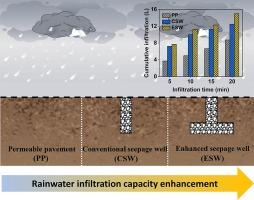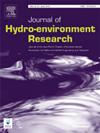Improvement of rainwater infiltration and storage capacity by an enhanced seepage well: From laboratory investigation to HYDRUS-2D numerical analysis
Abstract
Seepage well is an emerging Low Impact Development (LID) technology that can effectively control the storm runoff. However, its rainwater infiltration rate and storage capacity still require further enhancement. By setting a horizontal infiltration structure at the bottom of conventional rainwater seepage well (CSW), an enhanced seepage well (ESW) was proposed in this study, and its infiltration performances compared with the permeable pavement (PP) and the CSW were systemically investigated using static infiltration experiment and HYDRUS-2D simulation. The results showed that the infiltration efficiency of ESW was significantly higher than that of PP and CSW, and the process of water infiltrated through soil mainly controlled the macroscopic infiltration rate. The Nash-Sutcliff Efficient (NSE) index was used to evaluate the accuracy and reliability of the HYDRUS-2D model, and the results of NSE values greater than 0.75 (varied between 0.75 and 0.91) confirmed the applicability of HYDRUS-2D to describe correctly the hydraulic behavior of the ESW system. Simulation infiltration tests showed that the ESW performed a higher average infiltration rate and fewer total runoff volume than the CSW, indicating the effectively enhancement of the infiltration and water retention capacity of ESW, especially under heavy rainfall intensities. Additionally, the ESW system exhibited an excellent runoff-control and rainwater retention capacity in an actual rainfall scenario.


 求助内容:
求助内容: 应助结果提醒方式:
应助结果提醒方式:


